
*
There is a defining moment in Harold Pinter's No Man's Land — a word, really — that betrays Christopher Plummer's unbridled passion for the written text.
Playing a shabby wannabe poet, he is taking his leave of Jason Robards in an imperious huff, bundling up against the bitter cold and blathering on in a torrent of lofty verbiage. When he hits the last word of his speech — "nonchalance" — he flings a scarf across his shoulder and heads grandly for the exit. This occurred nearly 19 years ago in a Roundabout Theatre Company venue no longer standing, and the memory of it — "nonchalance," squeezed dry of all its French juice and pretention — is with me still.
"I don't remember it at all," the actor admitted over the phone last week, but he did allow that his love of words is so total he often makes an italic impression without realizing it. In the spirit of that is A Word or Two, his little solo celebration of the poetry of prose that will get a special 60th season presentation at the Stratford Shakespeare Festival July 25-Aug. 26, in Stratford, Ontario, directed by artistic director Des McAnuff.
To date, only McAnuff has seen and heard the piece. Plummer pitched it to him as an audition in the breakfast nook of his Connecticut home, letting his literary life of late pass in review. "Some are silly, some great, some funny, some extraordinary, some classical. There's a huge variety of stuff there, and I enjoy myself thoroughly because I love the words of each character. I have fun and try to make it as funny as I can because, when the serious stuff does appear, the audience is sorta ready for it." A Word or Two is his autobiographical trek through literature, leapfrogging from one favorite passage to another. Among the bases covered: Shaw, Shakespeare, Stephen Leacock, Archibald MacLeish, Ben Jonson, Ogden Nash and the Bible.
Plummer's point? "I suppose the main theme in it — which I don't hit over the head very hard, thank God! — is the fact that, in this day and age, young people in particular are losing the chance to really appreciate what great literature is... Books are disappearing. Parents should take care that they let their children know at a certain young age how wonderful and great our language is and what fun it is.
"My parents were marvelous. I was very lucky — I grew up in a very well-read home — and we were taught the value of books. Our family used to read aloud to each other sometimes after dinner. It was kind of an old Victorian custom, and it was great to be a part of that. They taught me reading could be fun as well as enriching.
"That's the theme underneath it, but I don't lecture anybody about it. I just show them that I had fun. The early section of my life was influenced by the books I was reading then — the A.A. Milnes and the Rudyard Kiplings. In my teens, I read different sorts of writers. When I reach middle age, we get all the love poems taken care of."
| |
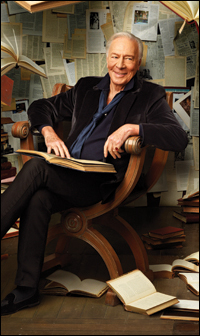 |
|
| Christopher Plummer | ||
| Photo by Andrew Eccles |
"What we're going to do is add a tiny bit of music underneath certain passages to lift them — very subtle because it's about words and not music—and it will relieve the tension of too much speech. The lighting, of course, is essential. Lighting can take the mood straight into the piece and then out again. Projections perhaps, but not many. If you have too much to look at, the audience stops listening to the words."
McAnuff's experience in helming one-man shows consists entirely of Billy Crystal's 700 Sundays, which is quite a different kettle of gefilte fish, but he has directed Plummer at Stratford before, most recently in The Tempest. "To hear Mr. Plummer," reviewed Charles Isherwood in The New York Times, "is to be bewitched by a spell that only authoritative classical actors can cast."
In Plummer's case, that spell stretched even farther back to radio and the Canadian Broadcast Company. "I grew up in radio, at the same time when Orson Welles was being such a radio star," he recalled. "God! we had some wonderful people to emulate and to learn from. In Toronto in the mid-to-late '40s, the radio had an extraordinary high standard. It was perhaps some of the best radio dramas being done in the world. There were a group of actors — I'd say about ten of them — who could do 25 different kinds of voices each.
They were absolutely trained for radio — and brilliant. John Drainie was probably the best radio actor in the world, and he usually played the leading roles. I joined that company, which was thrilling when I was about 19, and Orson would come up every now and then and be guest-star. "Andrew Allen [head of CBC Radio Drama from 1943 to 1955] was the resident genius who brought music and words together in these shows. We did everything, from modern, contemporary, new stuff to Peer Gynt to the Shakespeares. We did everything on the radio. It was wonderful. I miss that medium so much."
| |
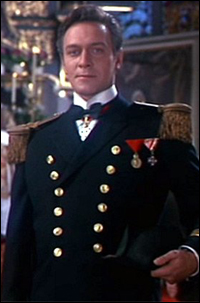 |
|
| Plummer in "The Sound of Music." | ||
| Courtesy 20th Century Fox Home Entertainment |
The actor has grown more comfortable over the years with the palm leaves his Captain Von Trapp got from the masses. "It only bothers you when you think they haven't seen anything else," he said. "It's just that the people see one thing, and they stick to it. Poor old Clark Gable was tortured by people who only remembered him for 'Gone With the Wind.' It's very nice to be known for 'The Sound of Music,' and I admire Julie [Andrews], and I admired Robert Wise [the director] very much.
"I wouldn't mind another one. I probably sing a bit better now that I'm terribly older than I did when I was young. If there was a great acting role as well as singing role, I'd like to do another musical. I had fun doing Cyrano. The serious parts in musicals aren't really challenging enough. Andrew Lloyd Webber once asked me to do a musical of his, and I asked him if you could sorta write some dialogue so that I could at least balance myself on stage and do what I do best and then sing along side it, but he wouldn't. It was all music. The whole damned thing was music, so . . ."
| |
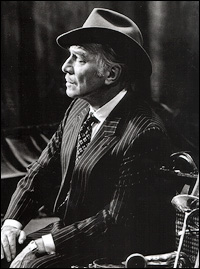 |
|
| Christopher Plummer in Barrymore. | ||
| Photo by Cylla Von Tiedemann |
"It's a proper film, more than a filmed record," he clarified. "Erik Canuel, who directed it, did very well with it. It's still a film performance on the stage, but it's changed because at certain moments the camera goes backstage and into rooms that belonged to Barrymore's grandmother, Mrs. Drew. It's quite cinematic. Closeups pick up things that you don't even know they're picking up. In one scene, Barrymore looks out from the stage, and there's no audience. Suddenly, the mood changes.
"We all worked on it collectively for so long. It was quite funny to start with, but they just were gags. Then we said, 'C'mon, let's find some depth to this bloody thing,' and of course there's a lot in Barrymore if you search for it. He's his own kind of self-destruction. Brooks Atkinson compared him to Icarus who flew too close to the sun."
His most recent brush with movie houses, the McAnuff-helmed Tempest, was pre-recorded live over two days at Stratford and presented in a cluster of theatres June 14. "It's a little more cinematic than a film recording, but we did not have time to really make a film out of it. It is, basically, the play photographed."
| |
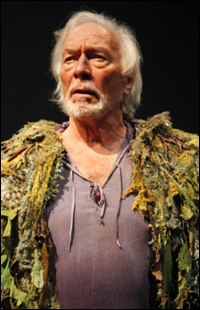 |
|
| Plummer in The Tempest. | ||
| photo by David Hou |
Plummer has played only one other gay man — opposite Joanne Woodward in the TV movie version of Michael Cristofer's Pulitzer Prize-winning The Shadow Box.
Since "Beginners," he has done three or four other features. "I did something with HBO — 'Muhammad Ali's Greatest Fight.' It's about the Supreme Court decision to grant him conscientious-objector status. It was a well-written script, and I'm The Good Guy, John Marshall Harlan, who was one of the judges who granted him this."
| |
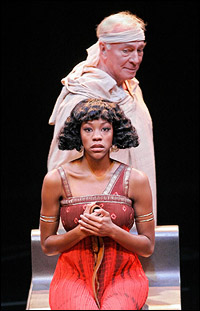 |
|
| Plummer and Nikki M. James in Caesar and Cleopatra at Stratford. | ||
| photo by David Hou |
His last Broadway appearance — his 17th — was as a fictional facsimile of Clarence Darrow in Inherit the Wind. What are the chances he'll next show up there as Christopher Plummer in A Word or Two? He responded cautiously: "Well, it's not that kind of a show. It probably would do better in a smaller theatre Off-Broadway, or a small theatre on Broadway where I could give it a limited run. It's not very long, but it's quite exhausting. It's just me talking for a bloody hour and a half. Barrymore was a toughie like that, but this one jumps around more, from one thing to another, different voices, different accents. And so it's highly concentrated.
"If it's well received and shows some promise — yeah, I'd love to come and do it for a limited run. The audience needs to be, at least for a part of it, well-read so they can recognize certain things that I do and know what the hell I'm talking about."
The filmed Tempest probably means he won't be doing Prospero on Broadway anytime soon. "The one I wanted to bring to New York was Caesar and Cleopatra — we might still do that. Nikki M. James, the young girl who won the Tony for Book of Mormon, was so wonderful in it. She was my Cleopatra and looked 16 on the stage, exactly the age that George Bernard Shaw had written her. I'm hoping that it will happen because it's a part that I could play till I'm 100."
Hail, Christopher! Keep the thought! For more about A Word or Two and the 2012 Stratford Shakespeare Festival — Plummer's Canadian artistic home — visit stratfordfestival.ca.









